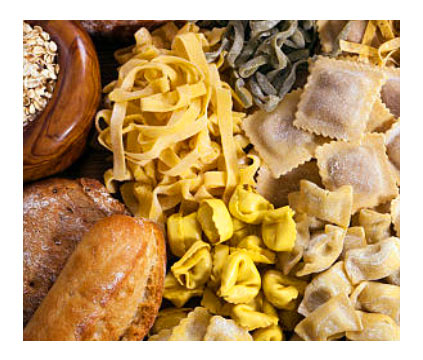What you need to know about Carbs!
One subject in the fitness community that is the source of more confusion and misinformation is carbohydrates.
We’re sure you’ve heard someone say at least one of the following:
“Never eat carbs after 6 p.m.”
“Stay away from all sugars if you want to get lean.”
“Carbs will make you fat.”
“Low carb diets are healthier for you.”
Statements like these, especially when taken out of context, can cause more harm than good, especially when referring to hard training athletes. Carbohydrates are an athlete’s best friend, and actually play a vital role for health and performance. Here are just a few reasons why carbs are so important:
Carbs are the preferred energy source for muscle: High intensity sports such as football, hockey, mixed martial arts, bodybuilding and powerlifting rely on a stored form of carbohydrate known as glycogen. Glycogen is stored in the muscle as well as the liver. When glycogen levels get too low, performance suffers.
Carbs provide energy to the brain and nervous system: Carbs (in this case, blood glucose) are without question the preferred energy source for the brain and nervous system. Optimal carb intake ensures proper functioning of the nervous system and ensures better muscle fibre recruitment and resistance to fatigue. For strength and power oriented athletes, you want your nervous system (and obviously your brain) firing on all cylinders to be at your best. Athletes who consume enough carbs also experience higher levels of motivation to train hard.
Carbs will enhance recovery from training: Consuming fast digesting carbs during or after your workout will replenish your glycogen stores and ensure you’re ready to go before your next training session. Chronically low glycogen levels (as a result of being low carb for too long) can prevent muscle gain and even increase the risk of muscle loss!
What Types of Carbs?
And When? Two of the most common questions we get from our athletes are what kinds of carbs are good to eat and when is the best time to eat carbs. While the answers will depend on the goal (fat loss, physique competition, strength sport, endurance sport, CrossFit), here are some simple guidelines to keep in mind:
Pre-Training (1-2 hours before your workout):
Choose slower digesting carb sources one to two hours before your training session. Great options include brown rice, sweet potato, quinoa, yams and wheat-free oatmeal. You also want to include a lean source of protein (such as chicken, turkey or white fish), some dark green veggies and a little fat (such as coconut oil or olive oil).
Intra-Training (during your workout):
We often recommend the use of carbohydrate powders during your workout to maximize performance and enhance recovery. Carb powders get into your system quickly to replenish depleted glycogen stores. Our favourite types of carbohydrate powders include dextrose, maltodextrin, waxy maize and Vitargo. Make sure you steer clear of artificial sweeteners and dyes when choosing a carb powder. And for even greater performance enhancing effects, we suggest combining your carbohydrate powder with a high quality BCAA (Branched Chain Amino Acid) product.
Post-Training (immediately after your workout):
Fast digesting carb sources are your best bet here. If you’ve used a carbohydrate powder during your workout, you can eat your carbs at this point. Great options include rice cakes, dates, white rice (yes, white rice!), or sweet fruits like organic pineapple. After your workout you also want to combine these fast carbs with a fast protein source. New Zealand whey protein powder from grass-fed cows, a high-quality brown rice protein or pea protein powder are great options. Avoid consuming fat right after your workout, as this will slow down the absorption of your fast carbs/proteins.
All Other Times:
For meals that are not close to your workout and for rest days, you mainly want to consume large amounts of fibrous carbs. Your best options for fibrous carbs are veggies, veggies and more veggies! In terms of calorie content, fibrous carbs such as broccoli and green beans are relatively low. Their high fibre content helps to keep your blood sugar levels stable (ideal for health and body composition). Other awesome sources of fibrous carbs include kale, collard greens, Swiss chard, asparagus, and of course Popeye’s favourite: spinach! Pair your fibrous carbs with a high quality protein source (i.e. grass-fed beef, free range turkey), some healthy fats (nuts, seeds, olive oil) and you’re good to go.
Take home message:
Carbs are not evil. In fact they are an important ally in your quest to maximize athletic performance and/or body composition.
Give this a try in the gym and let us know what kind of results you get!
Team Mammoth
P.S. The Team Mammoth community is growing! Click here to join us on
Facebook! And don't forget to follow us on
Instagram!

